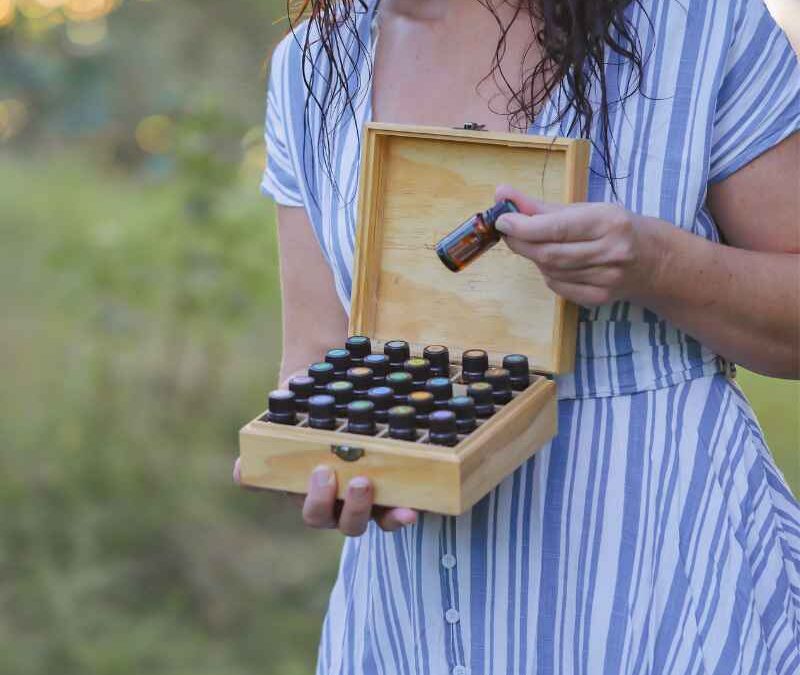The Ultimate Guide to Essential Oil Storage
Tips, Tricks, and Best Practices
Welcome essential oil and aromatherapy enthusiasts! As a certified aromatherapist, I understand the importance of proper essential oil storage. Your precious oils can lose their potency if not stored correctly. In this detailed guide, we’ll explore the ins and outs of essential oil storage, answer common questions, and provide you with expert tips to keep your essential oils organized and in prime condition.
How Should Essential Oils Be Stored?
Proper storage is key to preserving the therapeutic benefits of your essential oils. Here’s what you need to know:
- Temperature: Essential oils should be stored in a cool, dark place. Ideal temperatures range from 50°F to 70°F (10°C to 25°C). Avoid extreme temperature fluctuations.
- Humidity: Keep essential oils away from humidity. High humidity can cause oils to degrade and lose their aroma.
- Light: Store oils in amber or dark glass bottles to protect them from light. UV rays can break down the chemical compounds in oils.
- Recommended Containers: Choose dark glass bottles for your essential oils. Amber, cobalt blue, and violet glass are popular choices. For easy application, consider roller bottles with stainless steel or glass rollers.
- Organization: Label your bottles with the oil name and date of purchase. Organize them in a box or drawer to prevent unnecessary exposure to light and air.
Do You Keep Essential Oils in the Fridge?
Refrigeration is a topic that often sparks debate among essential oil enthusiasts. Here’s what you need to know:
- Refrigeration: While some oils can benefit from refrigeration, it’s not necessary for all. Oils like citrus and floral ones tend to be more heat-sensitive and may benefit from cooler storage.
- Pros and Cons: Pros of refrigeration include extending the shelf life of heat-sensitive oils and providing a cooling effect when applied. However, cold temperatures can cause some oils to thicken or solidify.
- Best for Certain Oils: Consider refrigeration for oils such as Neroli, Jasmine, and Citrus oils. Always check individual oil recommendations.
- Concerns: Be cautious with refrigeration if you live in a humid climate, as condensation can form inside the bottles, potentially introducing water into your oils. Moisture and condensation will cause essential oils to go rancid.
How Long Do Essential Oils Last in the Fridge?
Essential oils have a shelf life, even when stored correctly. Here’s what you should know:
- Shelf Life: Essential oils have different shelf lives. Some last for 1-2 years, while others can remain potent for 5 years or more.
- Refrigeration Impact: Refrigeration can help extend the shelf life of heat-sensitive oils by slowing down oxidation. However, it won’t make oils last indefinitely.
- General Guidelines: Keep an eye on your oils, check for changes in aroma or appearance, and discard them if they’ve gone bad. If an oil smells off or has changed color, it’s time to replace it.
- Extending Shelf Life: To prolong the life of your oils, always keep the lids tightly closed, store them upright, and minimize exposure to air and light.
What Holds Essential Oils Best?
The choice of storage containers can greatly impact the longevity and quality of your essential oils. Here’s what to consider:
- Dark Glass Bottles: Amber, cobalt blue, and violet glass bottles are excellent choices. They block UV rays and protect oils from light exposure.
- Wooden Storage Boxes: Wooden boxes can add a touch of elegance and organization to your essential oil collection. Ensure they are well-crafted and store the bottles in an upright position. Always keep the wooden box in a cool, dark environment.
- Essential Oil Storage Cases: These cases are designed specifically for essential oil bottles. They provide protection and organization, making it easy to store and transport your oils.
- UV Protection: UV protection is crucial. Always choose containers that shield your oils from light, and avoid clear or plastic bottles that offer minimal protection.
- Storing at Home: For home storage, dark glass bottles are the most practical choice. Wooden boxes and cases are great for display and organization.
Essential Oil Storage Tips and Tricks
Here are some additional tips and tricks to keep your oils in optimal condition:
- Childproofing: If you have children or pets at home, consider using childproof caps to prevent accidental spills or ingestion.
- Travel Storage: When traveling with essential oils, use a padded carrying case to protect your bottles from breakage. Ensure your oils are tightly capped and stored in an upright position.
- Handling Oils: Use a dropper or an orifice reducer to dispense oils. This prevents exposure to air and contamination, helping your oils last longer.
- Oxidation Prevention: Always wipe the bottle’s rim before capping to remove any oil residue. Oxygen and moisture can accelerate oxidation.
How can you tell if essential oils have gone bad?
Knowing if essential oils have gone bad is essential to ensure their safety and effectiveness. Here are some signs to look for:
- Change in Aroma: If the oil’s aroma has significantly altered and doesn’t match its original scent, it may have gone bad. Some oils may become rancid or develop an unpleasant odor.
- Change in Color: Essential oils are typically clear or have a specific color. If the oil has become cloudy, has particles or sediment, or has changed color, it may be spoiled. For example, citrus oils might become darker over time.
- Thickening or Solidification: Some essential oils can thicken or solidify when exposed to cold temperatures. If the oil doesn’t return to a liquid state at room temperature, it may have deteriorated.
- Irritation or Allergic Reactions: Using spoiled essential oils on your skin can lead to irritation or allergic reactions. If you experience redness, itching, or discomfort after applying an oil, discontinue use and discard it.
- Dull or Weak Aroma: A loss of potency or a very faint aroma could indicate that the oil is no longer as effective as it once was.
- Skin Sensitivity: Essential oils that have gone bad may cause skin sensitivity or even burns when applied. Always perform a patch test with any essential oil to check for adverse reactions.
- Expiry Date: Some essential oil bottles come with an expiry date. If your oil is past this date, consider it a strong indicator that it may have gone bad.
- Container Damage: If the bottle or its cap is damaged or compromised, air and light may have entered, leading to the degradation of the oil.
It’s important to note that essential oils do not “spoil” in the same way that food does, as they don’t harbor bacteria. Instead, their chemical composition can change over time, affecting their therapeutic properties and safety. To extend the shelf life of your oils, store them properly in a cool, dark place, keep the lids tightly closed, and minimize exposure to air and light. If you suspect an essential oil has gone bad, it’s best to err on the side of caution and replace it to ensure you’re using oils that are safe and effective.
Conclusion
Proper essential oil storage is essential to maintain the therapeutic properties and aroma of your oils. Whether you choose to refrigerate some oils or keep them in a dark glass bottle, following these storage tips will help you get the most out of your essential oil collection. Enjoy the wonderful world of aromatherapy, and keep those oils in prime condition for all your wellness needs.
Read Next:
Photosensitive Essential Oils Understanding Safety & Benefits
The information provided here is intended for educational purposes only and is not a substitute for professional medical advice, diagnosis, or treatment. Essential oils are potent natural compounds that can offer various benefits when used appropriately.
Some of the links on this website are affiliate links, which means that we may earn a commission if you click on the link or make a purchase using the link. When you make a purchase, the price you pay will be the same whether you use the affiliate link or go directly to the vendor’s website using a non-affiliate link. By using the affiliate links, you are helping support our website, and we genuinely appreciate your support



